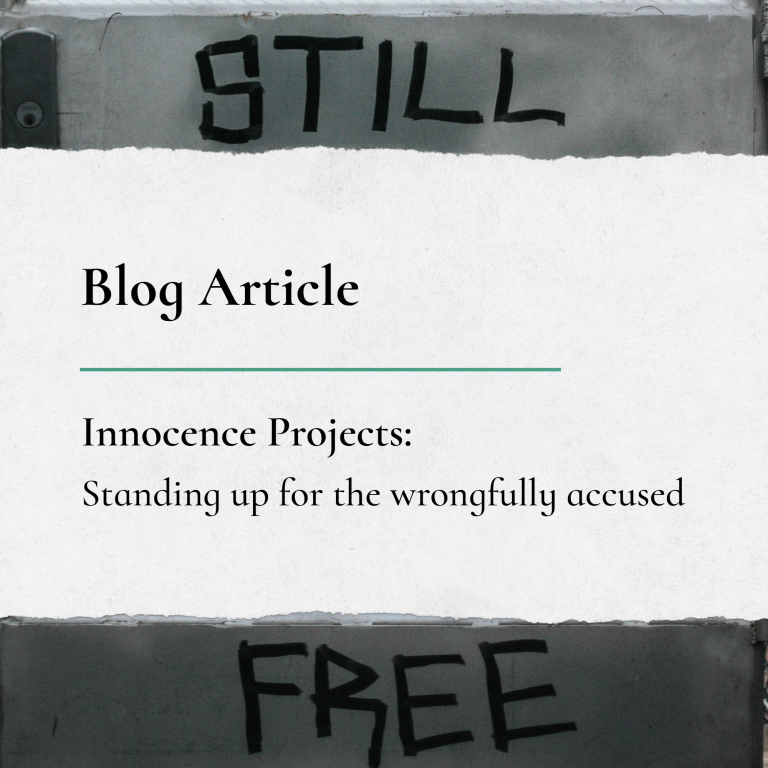‘It is better that ten guilty persons escape than that one innocent suffer’ — William Blackstone, 1760.
Today this sentiment is known as Blackstone’s ratio, and it serves as a poignant reminder that the criminal justice system does not always reach the right verdict. In fact, according to Civil Liberties Australia, there are currently 300 men and women imprisoned in Australia who are innocent.
Across Australia and internationally, many law students and legal professionals are working tirelessly to achieve justice and defend those wrongfully imprisoned by fighting wrongful accusations and convictions. Read on to learn about the crucial work of these incredible initiatives.
- The Griffith University Innocence Project:
The Griffith University Innocence Project is a pro-bono program that combines law students, academics and lawyers to correct failures in the Australian criminal justice system. Acting under supervision from legal professionals, law students review cases in search for gaps in the prosecution’s claims. Once found, they work towards an appeal.
Lynne Weathered, the Director of the Griffith University Innocence Project, identifies that wrongful convictions can easily occur at the hands of incorrect eyewitnesses, false confessions, unreliable scientific evidence, incentivised testimony, false accusations and police misconduct.
It’s especially likely given the disparity of resources between the prosecution and defence, particularly when many pro-bono services such as Legal Aid are receiving large funding cuts. A wrongful conviction can simply be a matter of ‘who argued best’, which is often influenced by who has the deepest pockets or better knowledge of the law and the jury’s leanings. Sometimes, the pursuit of truth and the administration of justice takes a backseat.
The Griffith University Innocence Project runs every trimester at Griffith’s Gold Coast Campus and can assist in cases where:
- Innocence can be established through new DNA evidence; or
- There has been a conviction and the appeal period has not expired.
If you or someone you know has been wrongfully convicted, you can contact the Griffith University Innocence Project here: https://www.griffith.edu.au/arts-education-law/griffith-law-school/learning-teaching/innocence-project
- The Bridge of Hope Innocence Project:
The Bridge of Hope Innocence Project is held at the Royal Melbourne’s Institute of Technology (RMIT) and is a joint venture between RMIT and The Bridge of Hope Foundation. It is open to undergraduate, honours and postgraduate students to get involved in and combines legal professionals with law students and everyday volunteers fighting for justice. The project adopts a forensic approach to examine claims of wrongful convictions, and campaigns for reform of issues that cause these injustices.
Claims come from people who are currently imprisoned or those released who are seeking to clear their name. The project places emphasis on supporting people who fall between the funding gap (those who do not qualify for Legal Aid despite the fact they are clearly unable to afford legal services) by providing pro-bono services.
Dr Gregory Stratton, a lecturer of law and justice at RMIT, identifies a promising aspect of the project is that it enables students to witness the ‘flaws in the system’ and later ‘change and rectify these flaws’ when they enter the legal or justice profession.
More information about the project (including how to get in touch) can be found here:
- The Innocence Project:
Founded in 1992 by the Cazoro School of Law, the Innocence Project is dedicated to exonerating wrongful convictions, freeing innocent people from death row and reforming the criminal justice system.
As of January 2019, the Innocence Project has seen 362 post-conviction exonerations due to DNA testing. 70% of people exonerated have come from minority groups, and in 44% of cases DNA testing identified the actual person responsible for the crime.
That’s 362 wrongful convictions in under 30 years.
The Innocence Project’s work extends to educating the public, lawyers and judicial officers about the ways in which wrongful convictions can occur. The Project also supports those exonerated as they re-enter into society. It’s important to realise that deprivation of liberty is just one impact of incarceration. When innocent people are branded as criminals, they become isolated from society, their reputation is tarnished and they lose the trust of their friends and family. Not to mention the extreme frustration and psychological torment a wrongful conviction has on an innocent person.
You can learn more about the incredible work of the Innocence Project here:
https://www.innocenceproject.org/
While the horrific reality is that wrongful convictions do happen, the much-needed work of the Innocence Project, Griffith University, RMIT and The Bridge of Hope Foundation is going a long way in reversing miscarriages of justice and standing up for the wrongfully accused.
If you or someone you know has been wrongfully accused of a crime, you can contact Green & Associates on (02) 8080 7585 so we can advise you on the best steps for you to take.




